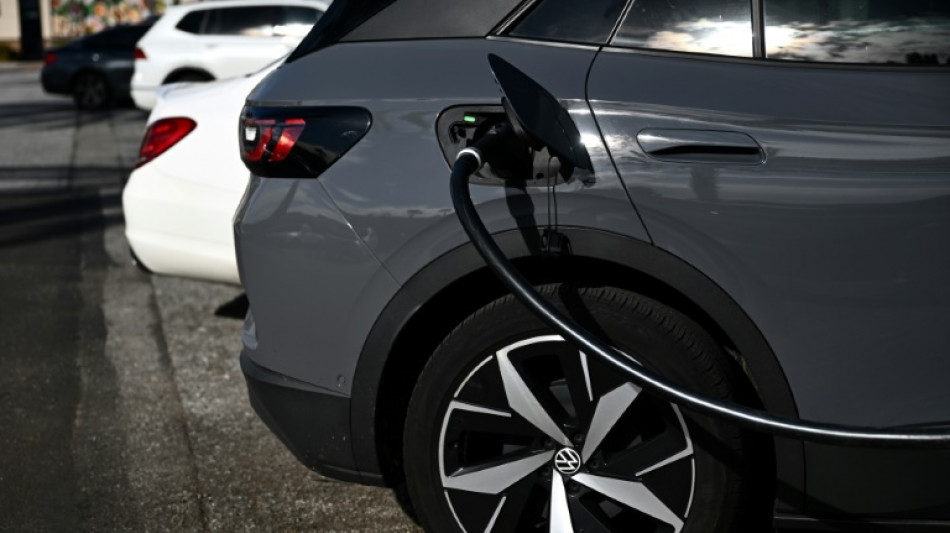
-
 EU warns Meta it must open up WhatsApp to rival AI chatbots
EU warns Meta it must open up WhatsApp to rival AI chatbots
-
Scotland spoil Italy's T20 World Cup debut with big win

-
 Israeli president says 'we will overcome evil' at Bondi Beach
Israeli president says 'we will overcome evil' at Bondi Beach
-
Munsey leads Scotland to 207-4 against Italy at T20 World Cup

-
 Japan restarts world's biggest nuclear plant again
Japan restarts world's biggest nuclear plant again
-
Bangladesh poll rivals rally on final day of campaign

-
 Third impeachment case filed against Philippine VP Duterte
Third impeachment case filed against Philippine VP Duterte
-
Wallaby winger Nawaqanitawase heads to Japan

-
 Thailand's Anutin rides wave of nationalism to election victory
Thailand's Anutin rides wave of nationalism to election victory
-
Venezuela's Machado says ally kidnapped by armed men after his release

-
 Maye longs for do-over as record Super Bowl bid ends in misery
Maye longs for do-over as record Super Bowl bid ends in misery
-
Seahawks' Walker rushes to Super Bowl MVP honors

-
 Darnold basks in 'special journey' to Super Bowl glory
Darnold basks in 'special journey' to Super Bowl glory
-
Japan's Takaichi may struggle to soothe voters and markets

-
 Seahawks soar to Super Bowl win over Patriots
Seahawks soar to Super Bowl win over Patriots
-
'Want to go home': Indonesian crew abandoned off Africa demand wages

-
 Asian stocks track Wall St rally as Tokyo hits record on Takaichi win
Asian stocks track Wall St rally as Tokyo hits record on Takaichi win
-
Bad Bunny celebrates Puerto Rico in joyous Super Bowl halftime show

-
 Three prominent opposition figures released in Venezuela
Three prominent opposition figures released in Venezuela
-
Israeli president says 'we shall overcome this evil' at Bondi Beach

-
 'Flood' of disinformation ahead of Bangladesh election
'Flood' of disinformation ahead of Bangladesh election
-
Arguments to begin in key US social media addiction trial

-
 Dr. Jonathan Spages Expands Diabetes Reversal Practice Across New States, Adds Clinical Team to Meet Growing Demand
Dr. Jonathan Spages Expands Diabetes Reversal Practice Across New States, Adds Clinical Team to Meet Growing Demand
-
Agronomics Limited Announces Net Asset Value Calculation as at 31 December 2025

-
 UK-Based Vesalic Limited Emerges from Stealth with Landmark Discovery of Potential Non-CNS Driver of Motor Neuron Diseases, including ALS, and Breakthrough Therapeutic and Diagnostic Opportunities
UK-Based Vesalic Limited Emerges from Stealth with Landmark Discovery of Potential Non-CNS Driver of Motor Neuron Diseases, including ALS, and Breakthrough Therapeutic and Diagnostic Opportunities
-
Gotterup tops Matsuyama in playoff to win Phoenix Open

-
 New Zealand's Christchurch mosque killer appeals conviction
New Zealand's Christchurch mosque killer appeals conviction
-
Leonard's 41 leads Clippers over T-Wolves, Knicks cruise

-
 Trump says China's Xi to visit US 'toward the end of the year'
Trump says China's Xi to visit US 'toward the end of the year'
-
Real Madrid edge Valencia to stay on Barca's tail, Atletico slump

-
 Malinin keeps USA golden in Olympic figure skating team event
Malinin keeps USA golden in Olympic figure skating team event
-
Lebanon building collapse toll rises to 9: civil defence

-
 Real Madrid keep pressure on Barca with tight win at Valencia
Real Madrid keep pressure on Barca with tight win at Valencia
-
PSG trounce Marseille to move back top of Ligue 1

-
 Hong Kong to sentence media mogul Jimmy Lai in national security trial
Hong Kong to sentence media mogul Jimmy Lai in national security trial
-
Lillard will try to match record with third NBA 3-Point title

-
 Vonn breaks leg as crashes out in brutal end to Olympic dream
Vonn breaks leg as crashes out in brutal end to Olympic dream
-
Malinin enters the fray as Japan lead USA in Olympics team skating

-
 Thailand's Anutin readies for coalition talks after election win
Thailand's Anutin readies for coalition talks after election win
-
Fans arrive for Patriots-Seahawks Super Bowl as politics swirl

-
 'Send Help' repeats as N.America box office champ
'Send Help' repeats as N.America box office champ
-
Japan close gap on USA in Winter Olympics team skating event

-
 Liverpool improvement not reflected in results, says Slot
Liverpool improvement not reflected in results, says Slot
-
Japan PM Takaichi basks in election triumph

-
 Machado's close ally released in Venezuela
Machado's close ally released in Venezuela
-
Dimarco helps Inter to eight-point lead in Serie A

-
 Man City 'needed' to beat Liverpool to keep title race alive: Silva
Man City 'needed' to beat Liverpool to keep title race alive: Silva
-
Czech snowboarder Maderova lands shock Olympic parallel giant slalom win

-
 Man City fight back to end Anfield hoodoo and reel in Arsenal
Man City fight back to end Anfield hoodoo and reel in Arsenal
-
Diaz treble helps Bayern crush Hoffenheim and go six clear


Bumpy ride for electric cars in Europe
Electric cars are a key part of Europe's green transition plans but the road ahead remains littered with obstacles with 10 years to go before a crucial milestone.
Despite the fact that the sale of new petrol and diesel cars will be banned in the European Union as of 2035, sales of plug-in "zero emission" vehicles have stalled in the region in recent months.
The market share for electric cars has shrunk from 14.16 percent last year to 12 percent or less since the start of this year, a drop attributed mainly to Germany's decision to abruptly halt subsidies for electric car purchases on Europe's biggest market at the end of 2023.
Sigrid de Vries, director general of the European Automobile Manufacturers' Association (ACEA), expressed "concern".
Fewer than 30 percent of Europeans say they plan to buy an electric vehicle (EV), according to the ACEA, and more than half refuse to pay more than 35,000 euros ($37,750) for a car, a price level offering few EVs.
The "2035 deadline... is really just around the corner, especially when you talk production cycles," de Vries told an EV conference last week in Lillestrom, Norway.
"We need to go from 15 percent (zero-emission cars) to 100 percent in about just around 10 years," she said.
At the end of 2023, EVs passed the "tipping point" of five percent -- considered the point of mass adoption -- in 31 countries around the world, according to the Bloomberg news agency.
But only two-thirds of the EU's 27 member states have surpassed this level.
Cars are Europeans' primary mode of transport, and account for 15 percent of Europe's CO2 emissions.
Making vehicles emissions-free is therefore essential if the EU wants to meet its climate commitments.
Norway, a non-EU member -- and also a major oil and gas producer -- is a leader in EV adoption.
Led by Tesla, electric vehicles accounted for 90 percent of new car registrations in Norway in the first quarter thanks to generous tax incentives.
The country aims to reach the 100 percent mark by 2025.
Carmakers like Volkswagen and Volvo have already ended sales of their combustion models in Norway.
- See-sawing sales -
Elsewhere, the industry's electrification is largely sluggish.
Britain has pushed back by five years its ban on the sale of new combustion cars, now expected in 2035, and many see this target as unrealistic to reach in Europe.
But Nissan, one of the first traditional carmakers to roll out a plug-in with its Leaf model, says sales that yo-yo are not a concern.
"It see-saws and it will always be like that," Guillaume Pelletreau, Nissan's vice president of electrification and connected services, told AFP.
"There was a really strong start to the wave of electrification in the past two years and now we are starting to normalise the process a bit," he said.
"We see nonetheless a clear upwards trend."
Volkswagen, Stellantis and Renault plan to introduce new, less expensive electric models in coming months, but they are also relying on their hybrid models to boost sales.
One of the main hurdles cited by industry experts is the difficulty to roll out the necessary EV infrastructure quickly and broadly.
More than half of the EU's charging stations are found in just two countries: Germany and the Netherlands, according to the ACEA.
In Spain for example, where people replace their cars only every 14 years on average, 65 percent of owners park them in the street, making charging a challenge, said Isabel Gorgoso, head of "new mobility" at energy group Cepsa.
"If you think about Norway 10 years ago, then you have Spain now," she said.
Other obstacles cited are the heaps of EU regulations for carmakers -- up to nine new ones per year -- and ever-changing national policies, which could be exacerbated further by rising support for Europe's populist movements, which are generally climate-sceptic.
"With high-stake European elections around the corner, what happens in the next few months could really determine the fate of Europe's vehicle industry," de Vries said.
X.Karnes--AMWN


